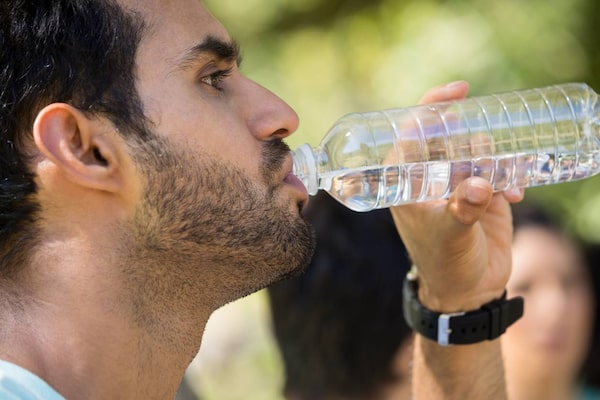
Getty Images/iStockphoto
As the beauty and fashion editor of a popular blog, Tracey Ho Lung is thirsty for trends – and sometimes, she's just plain thirsty for a drink of water.
Ho Lung used to reach for bottled water to hydrate herself and her family, but now the Toronto mom of two prefers filling a reusable bottle with filtered water instead. It's a move she says many of her friends are making too.
"When I met my husband, who is more of an environmentalist than I was at the time, he convinced me to use a refillable bottle," says Ho Lung, whose blog, Lovemom.ca, shares tips for hip young mothers.
For Ho Lung, kicking the bottled water habit was also about saving money.
"When you start having kids and times get tight, the last thing you want to do is spend $1.50 to $2.50 for a bottle of water," she says. "It drives me insane and I think it's completely unnecessary."
The latest data from Statistics Canada shows that as of 2015, bottled water was the primary water source for one in every five households in the Greater Toronto Area, though its popularity dropped from 34 per cent in 2007. That's still tens of thousands of households choosing to pay extra to get their water in one-use plastic bottles.
"A litre of bottled water at a name-brand drug store range[s] from $1.59 to $2.49, depending on the brand," says Sandra Foster, a Toronto-based financial author and consultant who's the president of Headspring Consulting Inc. "If bought in bulk at a big box store, the price might work out cheaper, but it's still more than the cost of the water from your tap."
Foster points out that some people choose bottled water because it seems more convenient or they don't think a "loonie here or there" will make a big difference.
"Certainly, a dollar or so a day will not get anyone anywhere fast. But over a month, this adds up to $30 – only you can decide what you want to do with this money," says Foster. "And this savings does not even consider the environmental costs of shipping the bottled water and dealing with the potential effects of bottled water on the environment."
The watchdog group Environmental Defence says that in Ontario alone, about 50 plastic bottles get tossed into a landfill every second.
When it comes to water quality, the City of Toronto consistently gets high marks for its municipal supply. "Affordable, clean water flows from our taps," the City of Toronto says on its website. "Our water supply is subject to online testing, continual samplings and read outs and daily testing for bacteriological quality."
To make doubly sure the water her family drinks is top quality, Ho Lung uses a water filter in her home.
"You can taste a difference and I do prefer it – it tastes fresher and cleaner to me," she says. Also, her two daughters tell her that they prefer the taste of filtered water.
"We're a water-loving family – we don't go anywhere without our filtered water, and our daughters always have a refillable bottle when they go to bed at night," she says. "They like the taste of filtered water, and if I can get them to drink it, it means fewer sugary drinks."
Still on the fence? Here are four reasons to make the switch from one-use plastic water bottles to reusable bottles and filtered water:
1. It's cheaper
Investing in an inexpensive water filtration system can save you hundreds, or even thousands, per year when compared with regularly purchasing bottled water. A Brita Water Filtration Pitcher, for example, can retail for $20 – $40, with replacement filters costing about $20 for a 3-pack.
2. It's easy
Filtered water can be kept in the fridge at all times to boost the convenience factor and encourage family members to stay hydrated. And if your kids dislike the taste of regular tap water, filtering can encourage them to drink up.
3. It's eco-friendly
Think of the cost of producing one-use plastic bottles, the fumes from the trucks that lug it to stores, and the landfills where many plastic bottles end up. In contrast, just one Brita Bottle filter can replace up to 300 500-ml plastic water bottles.
4. It's persuasive to kids
Encouraging reuse at an early age can set kids up for a lifetime of environmental responsibility.
This content was produced by The Globe and Mail's Globe Edge Content Studio. The Globe's editorial department was not involved in its creation.